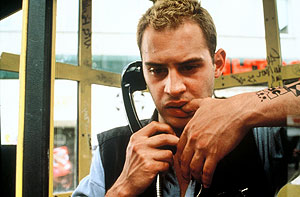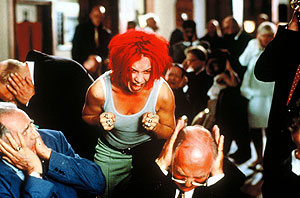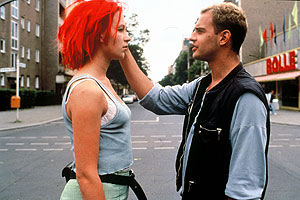
Run Lola Run

RUN LOLA RUN (MOVIE)
Prokino Filmverleih
Original release: August 20th, 1998
Running time: 81 minutes
Country of origin: Germany
Original language: German
Writer and director: Tom Tykwer
Cast: Franka Potente, Moritz Bleibtreu

Although we don’t think about it very often, every moment of our lives is important. They influence not only our next actions, but the rest of our lives and the lives of those around us.
What if one little thing in any given situation were to change – how would that affect us and the grand scheme of things?
A simple act of turning a different corner can have a huge ripple effect in our lives and the lives of those around us, and the lives those around them…and those around them If we thought about the effects of each and every action like this, would we make more careful and conscious decisions or would we do nothing at all?
Run Lola Run was the first German film I ever saw, and I remember it as clearly as yesterday because I’d never seen anything like it before. Its franticly paced story and adrenalin fuelled performances by its main cast made it memorable, but it also presented me with a fascinating look at the infinite amount of possibilities our lives can offer at each moment.
The film begins with Lola (Franka Potente) receiving a phone call from her boyfriend, Manni (Moritz Bleibtreu). He tells her he’s just lost 100,000DM that was in a bag he left on a train. Manni is a small-time criminal and the money belongs to his boss who won’t be very happy when he finds out.
With only 20 minutes to find a solution, he tells Lola he’s going to rob a supermarket, but she insists on him waiting for her – she’ll find another way to come up with the money instead.

From there the clock starts. Lola runs from her apartment and down the stairs, passing a man with dog which barks at her. On the street she runs into a woman with a pushchair and as she continues to run, she causes a car accident. Arriving at the bank where her father works, she asks him for a loan, but she’s caught him at a bad time and he refuses.
Frustrated, and with time running out, she runs to meet Manni who’s already holding up the supermarket. They try to make their get-away with the money, but the police arrive and Lola’s shot in the chest.
As she lies in the street, bleeding out, the clock is reset. We’re back at the start of the run, replaying the events we’ve just seen but with minor differences that turn out to have larger consequences later on, not just for Lola but also for the people she encounters, including her neighbour, the motorist, her father and least of all, Manni.
In total, Run Lola Run presents us with three versions of events that all start with the same objective – Lola finding a way to come up with 100,000DM to save Manni’s life.
It’s a fascinating film and one that leaves a lasting impression. Tykwer’s story never  loses momentum and his aim remains clear throughout; he wants to show us how our actions have ripple effects in the world around us, and not just in our own private little bubbles.
loses momentum and his aim remains clear throughout; he wants to show us how our actions have ripple effects in the world around us, and not just in our own private little bubbles.
Several times in the film he jumps forward into people’s lives to show us how this present moment will affect them, or how other seemingly random events will play out. This happens with the woman and the pushchair; in one possible future her baby is taken away by social services and she ends up stealing someone else’s child. In another possible future, she wins the lottery.
With three possible “endings” to Lola and Manni’s predicament, I remember being uncertain as to which one was real. If the clock was reset two times already, there’s no guarantee the third time’s the final just because it works out in their favour.
The possibilities are endless but they don’t begin and end there either, if we really want to, we can go back even further and reset the moment Lola decided to buy a pack of cigarettes, leaving her moped outside the shop where it’s stolen.  As she was on the way to collect Manni, he was then forced to get on the train, where he lost the money.
As she was on the way to collect Manni, he was then forced to get on the train, where he lost the money.
Digging further back, we could look at another possible timeline where Lola didn’t start smoking at all, and Manni didn’t fall into a life of petty crime – would they have even met then? How many other things would be affected?
The picture we’re left with is one where determinism is always present. We start to see how the characters’ choices are influenced by a previous set of actions and how those previous actions were results of other choices…
I’d just turned 21 at the time when I first saw Run Lola Run and once I started thinking about my own life and the choices I’d made so far, the idea of free will quickly dissolved but the possibilities remained endless, and still do.

Patrick Samuel
The founder of Static Mass Emporium and one of its Editors in Chief is an emerging artist with a philosophy degree, working primarily with pastels and graphite pencils, but he also enjoys experimenting with water colours, acrylics, glass and oil paints.
Being on the autistic spectrum with Asperger’s Syndrome, he is stimulated by bold, contrasting colours, intricate details, multiple textures, and varying shades of light and dark. Patrick's work extends to sound and video, and when not drawing or painting, he can be found working on projects he shares online with his followers.
Patrick returned to drawing and painting after a prolonged break in December 2016 as part of his daily art therapy, and is now making the transition to being a full-time artist. As a spokesperson for autism awareness, he also gives talks and presentations on the benefits of creative therapy.
Static Mass is where he lives his passion for film and writing about it. A fan of film classics, documentaries and science fiction, Patrick prefers films with an impeccable way of storytelling that reflect on the human condition.
© 2022 STATIC MASS EMPORIUM . All Rights Reserved. Powered by METATEMPUS | creative.timeless.personal. | DISCLAIMER, TERMS & CONDITIONS
HOME | ABOUT | CONTACT | TWITTER | GOOGLE+ | FACEBOOK | TUMBLR | YOUTUBE | RSS FEED
CINEMA REVIEWS | BLU-RAY & DVD | THE EMPORIUM | DOCUMENTARIES | WORLD CINEMA | CULT MOVIES | INDIAN CINEMA | EARLY CINEMA
MOVIE CLASSICS | DECONSTRUCTING CINEMA | SOUNDTRACKS | INTERVIEWS | THE DIRECTOR’S CHAIR | JAPANESE CINEMA





